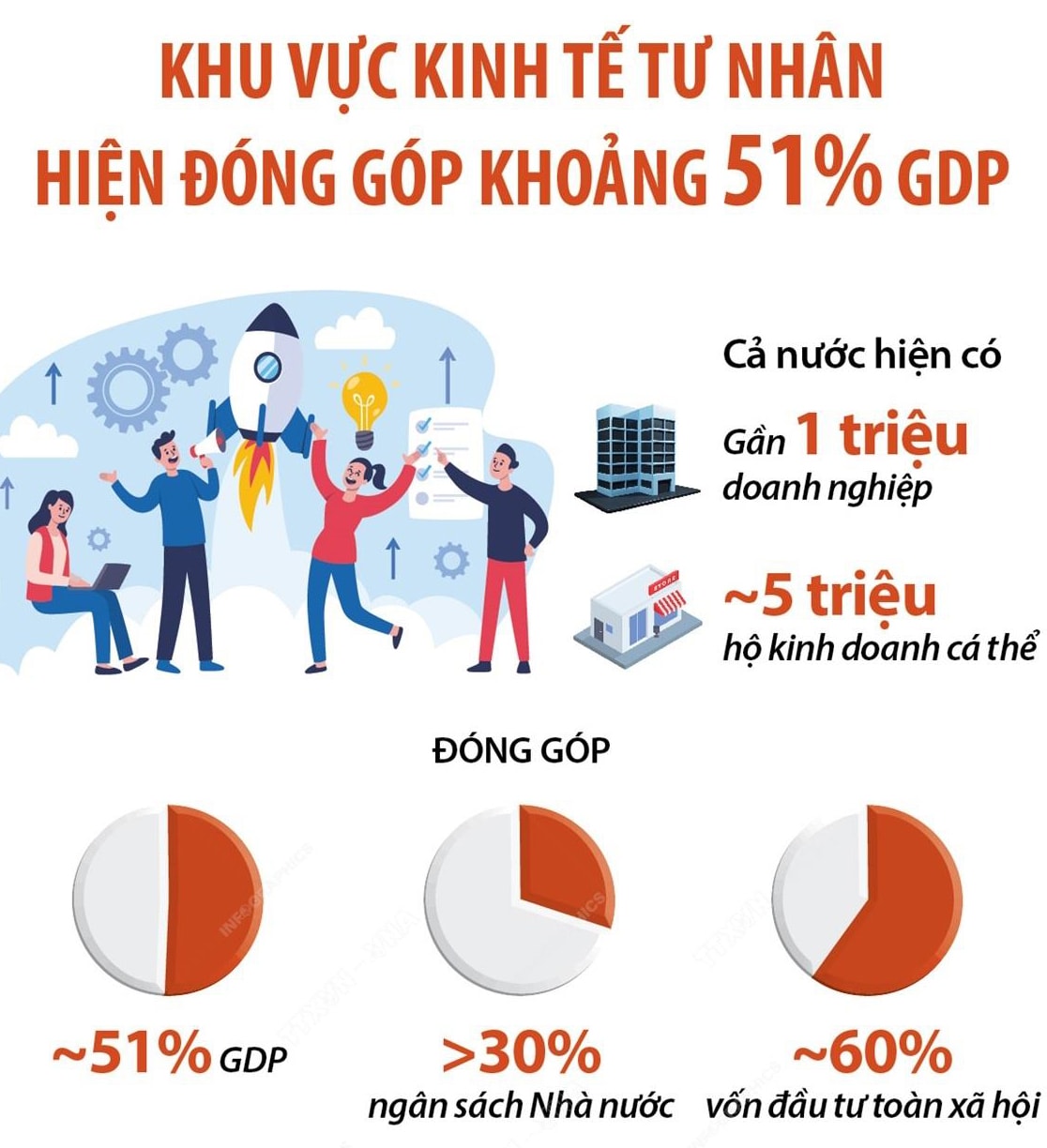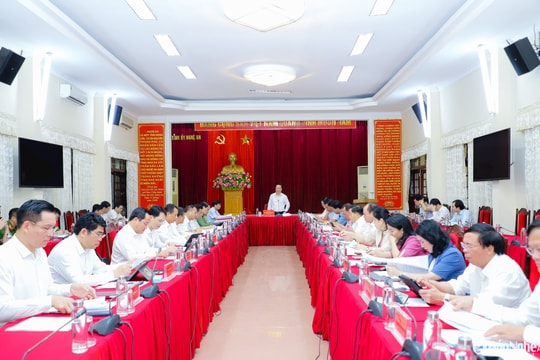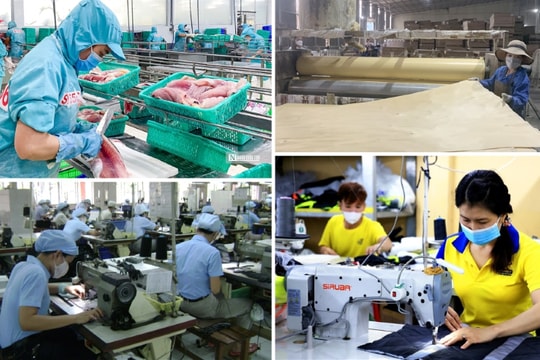The most important resolution to help the private economy break through
During nearly 40 years of renovation, the private economic sector in Vietnam has developed strongly, contributing greatly to GDP, creating jobs, promoting growth, innovation and international economic integration. However, the role of the private economic sector has never been affirmed as strongly as in Resolution No. 68-NQ/TW dated May 4, 2025 of the Politburo, when for the first time "the private economy was identified as the most important driving force of the national economy".

This is a breakthrough in development thinking. From a position that was overlooked and even heavily prejudiced many years ago, the private economy is now placed on par with the state economy and collective economy, playing a core role in building an independent, autonomous and deeply integrated economy. Not only does the resolution acknowledge, it also respects and nurtures the entrepreneurial spirit, affirming the role of entrepreneurs as "soldiers on the economic front".
This breakthrough thinking not only demonstrates the maturity of awareness within the Party, but also a strong political commitment to the business community, business households and all people: The State will be the creator, enterprises will be the center, and private economic development will be a long-term strategy, not a temporary measure.
It can be said that this is a particularly important document, if not the most important ever, for the private economy.
Inspiring goals
Resolution 68 sets out both specific and inspiring goals, demonstrating a strategic vision for 2030 and beyond to 2045. The goal of increasing the number of enterprises to 2 million by 2030 – double the current number – along with striving for the private sector to contribute up to 58% of GDP, account for 40% of state budget revenue and create jobs for 85% of the workforce, shows the Party’s strong confidence in the private economic sector.

In particular, setting the goal of having at least 20 large private enterprises participating in the global value chain by 2030, and developing to 3 million enterprises by 2045, clearly demonstrates the aspiration to bring the Vietnamese private economy to the open sea, deeply integrating into the regional and global economy.
More importantly, these goals are not just quantitative numbers, but also messages that arouse national pride, the desire to get rich legitimately, the will to innovate and the spirit of dedication of entrepreneurs, businesses and every Vietnamese citizen.
Remove bottlenecks at their root
To achieve this ambitious goal, Resolution 68 does not stop at appeals or slogans, but goes to the root of the problem: institutional reform. A series of strong solutions are proposed, from reforming administrative procedures, cutting down business conditions, digitizing the entire process, to protecting property rights, freedom of business, ensuring fair competition and contract enforcement.
The resolution requires a shift from pre-control to post-control, from the "ask-give" mindset to the service mindset; affirming that enterprises have the right to freely conduct business in all fields that are not prohibited by law, and any restrictions, if any, are only imposed for truly necessary reasons and must be clearly stipulated in the law. This, if seriously implemented, will be a breakthrough that fundamentally changes the investment and business environment in Vietnam.
Not stopping at administrative reform, the Resolution also provides specific policies to support businesses in accessing land, capital, high-quality human resources, encouraging digital transformation, innovation, sustainable development and connecting to global value chains. In particular, the small and medium-sized enterprises and business households - which are the largest force - are also designed with separate support mechanisms, from tax exemption to providing free digital platforms and legal advice.
These solutions are the key to removing institutional bottlenecks - the root cause that has hindered the development of the private sector for many years. Moreover, they are a clear manifestation of a new way of thinking: no longer viewing the private economy as an object of regulation, but as a companion partner, a strategic force in the process of national development.
Creating and strengthening trust
One of the highlights of Resolution 68 is the emphasis on trust - an intangible but essential asset for the private economy to develop strongly and sustainably. The Resolution affirms the role of the State in creating a transparent, stable, predictable and internationally standardized business environment. This is a prerequisite for businesses to confidently invest long-term, innovate and expand their operations.
For the first time, a Politburo resolution clearly stated that the guarantee of property rights, freedom of business, fair competition and contract enforcement must not only be on paper, but must be institutionalized by specific laws and effectively protected in practice. Removing legal barriers, the mindset of "if you can't manage, then ban" and the "ask - give" mechanism will liberate the entrepreneurial spirit, unlock social resources, promote innovation and improve national competitiveness.
From these breakthroughs, Resolution 68 is not only a strategic orientation for private economic development, but also a foundation for building solid trust for people and businesses - so that they believe that starting a business is a legitimate path, getting rich is encouraged, innovation is a lever for development, and the law is a safe support for all efforts to contribute.

Unlocking Resources
Resolution 68 provides specific solutions to ensure private enterprises have equal access to development resources. Regarding land, promote transparency, electronic transactions and reduce procedural time. Regarding capital, expand mobilization channels through green credit, the stock market, investment funds and community fundraising. Regarding human resources, promote practical training, foster executive training, digital skills and foreign languages, meeting the requirements of digital transformation.
Promoting innovation and digital transformation
The resolution provides many incentives for innovative enterprises such as tax exemptions, tax reductions, R&D expense deductions, technology development funds and technology sandboxes. This is a strong push for the private sector to escape its passive role and become a pioneering technology and business model owner. Digital transformation, if properly invested, will help enterprises improve productivity and competitiveness.
Expanding development space
The resolution encourages the connection between private enterprises with state-owned enterprises and FDI, forming a sustainable domestic supply chain. At the same time, the "Go Global" program shows the vision of bringing Vietnamese enterprises to the international market, not only playing a domestic role but also participating in the global value chain.
Substantial support for small businesses and sole proprietors
The resolution pays special attention to small, micro and household businesses - the majority. Eliminating lump-sum taxes, providing free accounting software, simplifying financial management and providing management training are practical solutions to support them in transforming into more systematic and transparent businesses. Inclusive financial policies also create more opportunities for women, youth and ethnic minorities to rise up.

Entrepreneurs: Development partners with the Party and the country
The resolution affirms that entrepreneurs are the main force in economic creation. They are not only protected and supported, but also encouraged to participate in policy debate and contribute to the planning and implementation of development strategies. This is a big step forward in awareness, placing trust in the intelligence, ethics and aspirations of the business community.
Faith - Resources - Aspiration
Resolution 68 is a major turning point in the thinking of private economic development, not only opening up new spaces but also building strong confidence. When the private sector is recognized as the central driving force, the right to do business is protected, innovation and integration are supported, then every entrepreneur and every citizen can believe that their success is the success of the nation.
If effectively implemented, this Resolution will be a catalyst to bring Vietnam into a new era of development – an era of creativity, integration and prosperity, in which the private economy plays a leading role with a proactive, self-reliant and ambitious spirit.


.png)


